(完整word版)译林三年级英语之阅读专项训练
英语三年级下册“阅读选择”专题复习(译林版-三起)
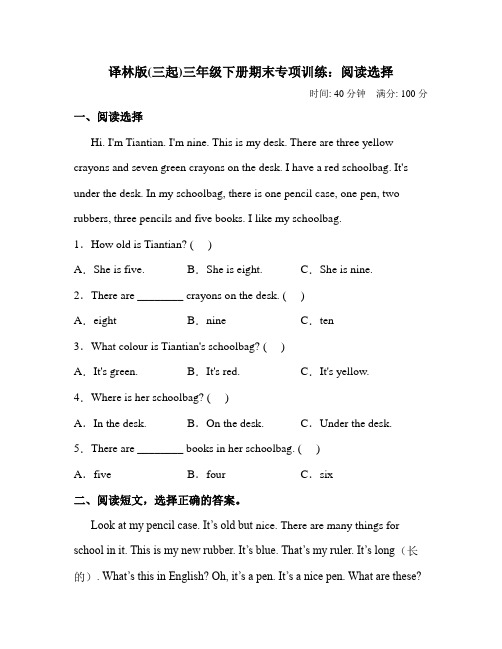
译林版(三起)三年级下册期末专项训练:阅读选择时间: 40分钟满分: 100分一、阅读选择Hi. I'm Tiantian. I'm nine. This is my desk. There are three yellow crayons and seven green crayons on the desk. I have a red schoolbag. It's under the desk. In my schoolbag, there is one pencil case, one pen, two rubbers, three pencils and five books. I like my schoolbag.1.How old is Tiantian? ( )A.She is five. B.She is eight. C.She is nine. 2.There are ________ crayons on the desk. ( )A.eight B.nine C.ten3.What colour is Tiantian's schoolbag? ( )A.It's green. B.It's red. C.It's yellow. 4.Where is her schoolbag? ( )A.In the desk. B.On the desk. C.Under the desk. 5.There are ________ books in her schoolbag. ( )A.five B.four C.six二、阅读短文,选择正确的答案。
Look at my pencil case. It’s old but nice. There are many things for school in it. This is my new rubber. It’s blue. That’s my ruler. It’s long(长的). What’s this in English? Oh, it’s a pen. It’s a nice pen. What are these?They’re four pencils. I like my pencil case very much.1.My pencil case is _____. ( )A.new B.big C.nice2.My rubber is _____. ( )A.blue B.black C.brown3.My ruler is _____. ( )A.new B.long C.short4.My _____ is nice. ( )A.rubber B.ruler C.pen5.I have _____ pencils. ( )A.three B.four C.Five三、阅读选择Hi, I'm Daniel. This is my classroom. There are some desks and chairs in it. Three windows are in the wall (墙壁). The blackboard is behind the teacher's desk (讲台). And they are my friends. Kim is beside Sandy. Sandy sits behind Amy. Where am I? Guess! I'm behind Tom!1.How many windows are there in the wall? ( )A.One. B.Two. C.Three. 2.Where is the blackboard? ( )A.On the teacher's desk.B.Behind the teacher's desk.C.Under the teacher's desk.3.Is Sandy behind Kim? ( )A.Yes, she is.B.No, she isn't.C.We don't know.4.Is Kim behind Amy? ( )A.Yes, she is.B.No, she isn't.C.We don't know.5.Where is Daniel? ( )A.He's behind Sandy.B.He's beside Amy.C.He's behind Tom.四、阅读短文,根据理解选择合适的答案。
(word完整版)三年级下册英语阅读理解专项训练
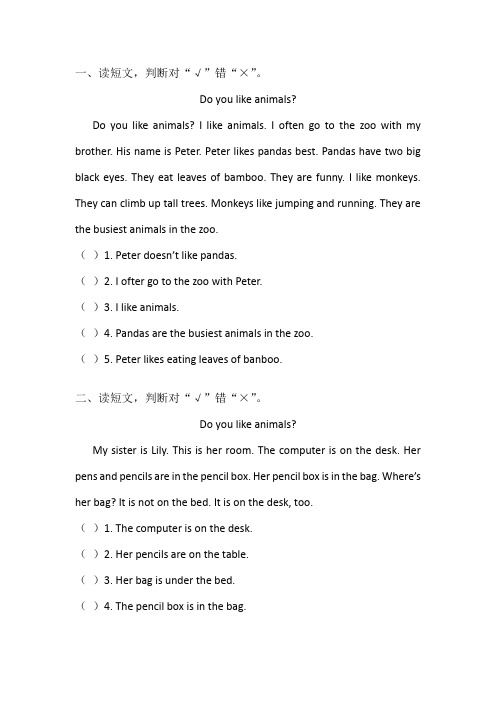
Do you like animals?Do you like animals? I like animals. I often go to the zoo with my brother. His name is Peter. Peter likes pandas best. Pandas have two big black eyes. They eat leaves of bamboo. They are funny. I like monkeys. They can climb up tall trees. Monkeys like jumping and running. They are the busiest animals in the zoo.()1. Peter doesn’t like pandas.()2. I ofter go to the zoo with Peter.()3. I like animals.()4. Pandas are the busiest animals in the zoo.()5. Peter likes eating leaves of banboo.二、读短文,判断对“√”错“×”。
Do you like animals?My sister is Lily. This is her room. The computer is on the desk. Her pens and pencils are in the pencil box. Her pencil box is in the bag. Where’s her bag? It is not on the bed. It is on the desk, too.()1. The computer is on the desk.()2. Her pencils are on the table.()3. Her bag is under the bed.()4. The pencil box is in the bag.Tom: Mom, look there! Rain!Mom: Oh, no! I don’t like rain.Tom: I like it very much. Let’s go to the park.Mom: OK. But(但是)I can’t find my umbrella. Where is it?Tom: Is it on the desk?Mom: No!Tom: Is it in the box?Mom: No!Tom: Is it behind the desk?Mom: Yeah. You are right.Tom: Now, let’s go!()1. Tom doesn’t like rain.()2. Tom’s mother like rain.()3. Tom’s mother can’t find her umbrella.()4. The umbrella is on the desk.()5. Tom can’t find his umbrella.()6. The umbrella is behind the desk.()7. They will(他们将要)go to the park.四、阅读短文,判断正(T)误(F)。
【阅读专项】六年级英语上册期末专项练习 -阅读理解 译林版三起 (word版,含答案)
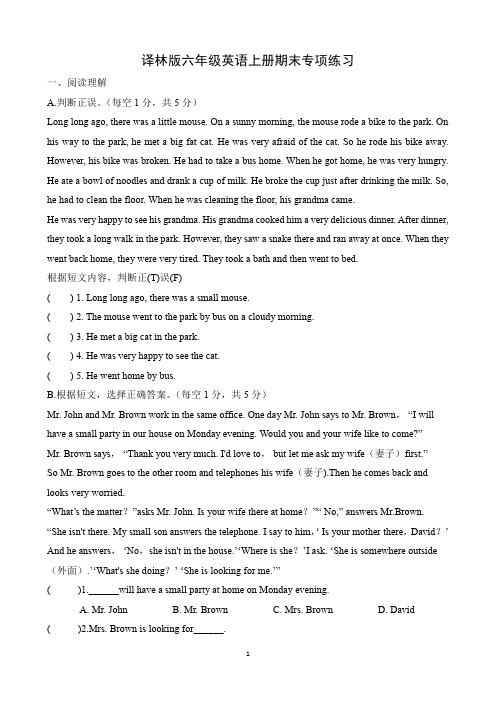
译林版六年级英语上册期末专项练习一、阅读理解A.判断正误。
(每空1分,共5分)Long long ago, there was a little mouse. On a sunny morning, the mouse rode a bike to the park. On his way to the park, he met a big fat cat. He was very afraid of the cat. So he rode his bike away. However, his bike was broken. He had to take a bus home. When he got home, he was very hungry. He ate a bowl of noodles and drank a cup of milk. He broke the cup just after drinking the milk. So, he had to clean the floor. When he was cleaning the floor, his grandma came.He was very happy to see his grandma. His grandma cooked him a very delicious dinner. After dinner, they took a long walk in the park. However, they saw a snake there and ran away at once. When they went back home, they were very tired. They took a bath and then went to bed.根据短文内容,判断正(T)误(F)( ) 1. Long long ago, there was a small mouse.( ) 2. The mouse went to the park by bus on a cloudy morning.( ) 3. He met a big cat in the park.( ) 4. He was very happy to see the cat.( ) 5. He went home by bus.B.根据短文,选择正确答案。
(word完整版)新版译林英语三年级下册期终复习重点整合
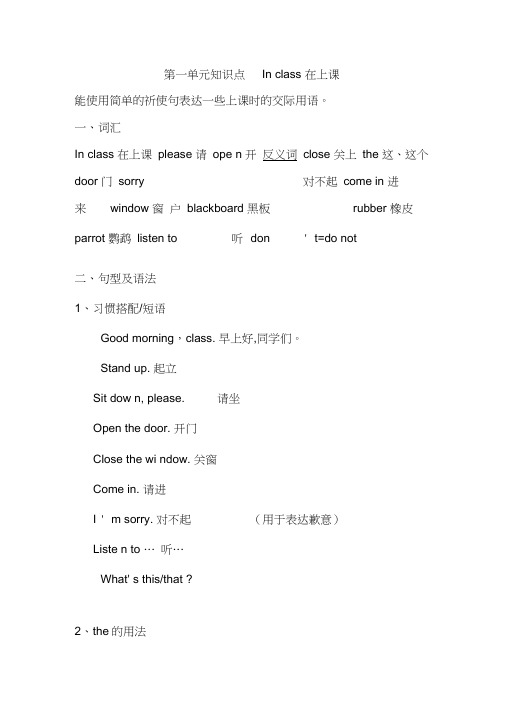
第一单元知识点In class 在上课能使用简单的祈使句表达一些上课时的交际用语。
一、词汇In class 在上课please 请ope n 开反义词close 关上the 这、这个door 门sorry 对不起come in 进来window 窗户blackboard 黑板rubber 橡皮parrot 鹦鹉listen to 听don ' t=do not二、句型及语法1、习惯搭配/短语Good morning,class. 早上好,同学们。
Stand up. 起立Sit dow n, please. 请坐Open the door. 开门Close the wi ndow. 关窗Come in. 请进I ' m sorry. 对不起(用于表达歉意)Liste n to … 听…What' s this/that ?2、the的用法定冠词the用来特指人或事物。
所指的人或事物是同类中特定的一个。
可以和单、复数名词,也可以和不可数名词连用例:the apple 这个苹果(许多的苹果中,特指这一个苹果,而不是其他的苹果。
)4、询问“这/那是什么? ”的句型及其答句What' s this/that ? It ' s …5、Don' t 引导的祈使句结构:① Don ' t + 动词原形+ 其他② Don ' t be + 其他。
Don ' t listen to the parrot. 不要听鹦鹉的Don ' t be late.不要迟到。
6、“某人有某物”的表达主语+ have/has … have/has的意思是3、Mr 的用法对男士的尊称为 Mrs 太太、夫人 Miss 小姐Mr …(…先生) (是对已婚妇女的称呼)“拥有主语是三单的时候要用has。
例:Bob has two big books. 鲍勃有2本大书。
高考英语(译林版)一轮复习练习:必修1_3_unit_3阅读理解轻松闯关_word版含解析
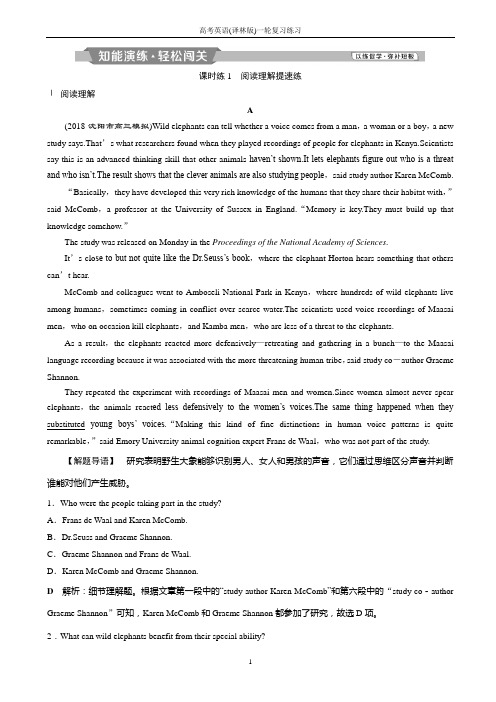
课时练1阅读理解提速练Ⅰ阅读理解A(2018·沈阳市高三模拟)Wild elephants can tell whether a voice comes from a man,a woman or a boy,a new study says.That’s what researchers found when they played recordings of people for elephants in Kenya.Scientists say this is an advanced thinking skill that other animals haven’t shown.It lets elephants figure out who is a threat and who isn’t.The result shows that the clever animals are also studying people,said study author Karen McComb.“Basically,they have developed this very rich knowledge of the humans that they share their habitat with,”said McComb,a professor at the University of Sussex in England.“Memory is key.They must build up that knowledge somehow.”The study was released on Monday in the Proceedings of the National Academy of Sciences.It’s clo se to but not quite like the Dr.Seuss’s book,where the elephant Horton hears something that others can’t hear.McComb and colleagues went to Amboseli National Park in Kenya,where hundreds of wild elephants live among humans,sometimes coming in conflict over scarce water.The scientists used voice recordings of Maasai men,who on occasion kill elephants,and Kamba men,who are less of a threat to the elephants.As a result,the elephants reacted more defensively—retreating and gathering in a bunch—to the Maasai language recording because it was associated with the more threatening human tribe,said study co-author Graeme Shannon.They repeated the experiment with recordings of Maasai men and women.Since women almost never spear elephants,the animals react ed less defensively to the women’s voices.The same thing happened when they substituted young boys’ voices.“Making this kind of fine distinctions in human voice patterns is quite remarkable,”said Emory University animal cognition expert Frans de Waal,who was not part of the study.【解题导语】研究表明野生大象能够识别男人、女人和男孩的声音,它们通过思维区分声音并判断谁能对他们产生威胁。
(完整word版)三年级英语考试试题
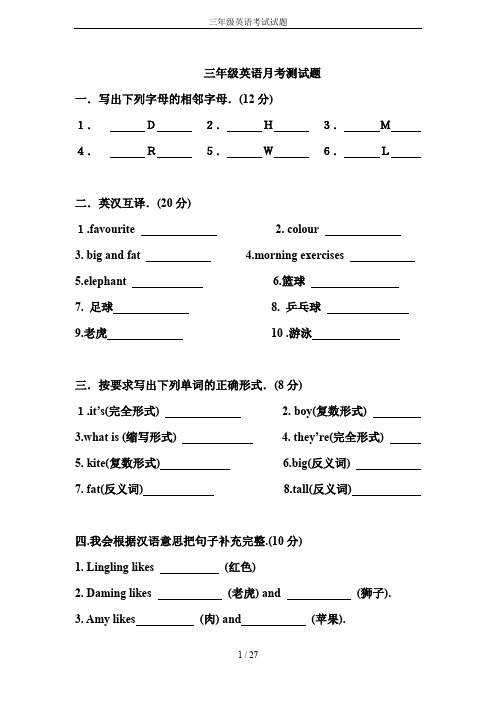
三年级英语月考测试题一.写出下列字母的相邻字母.(12分)1.D2.H3.M4.R5.W6.L二.英汉互译.(20分)1.favourite 2. colour3. big and fat4.morning exercises5.elephant6.篮球7. 足球8. 乒乓球9.老虎10 .游泳三.按要求写出下列单词的正确形式.(8分)1.it’s(完全形式) 2. boy(复数形式)3.what is (缩写形式)4. they’re(完全形式)5. kite(复数形式)6.big(反义词)7. fat(反义词) 8.tall(反义词)四.我会根据汉语意思把句子补充完整.(10分)1. Lingling likes (红色)2. Daming likes (老虎) and (狮子).3. Amy likes (肉) and (苹果).4. I like (跳绳) and (骑自行车).5. Sam likes (足球) and (乒乓球).五.选择填空.(20分)( ) 1. Look the toys.A. atB. inC. on( ) 2. The elephant’s nose is very .A. shortB. longC. fat( ) 3. A monkey has hands.A. twoB. oneC. three( ) 4.—. What are they? — They’re .A . a lion B. lion C. lions( )5. — this? — It’s a panda.A. WhatB. What’sC. what’s( ) 6. These are tigers. They’re .A. a bigB. BigC. big( ) 7. Daming like football.A. doB. don’t C . does n’t( ) 8. This is apple.A. anB. aC. it( ) 9. I like morning exercises.A . do B. don’t C . isn’t( )10. I like cats and they like .A. IB. myC. me六.情景反应.(4分)( ) 1.你在动物园看见一只像猫但比猫大的动物,你想知道这是什么动物,该怎样问?A. What’s this?B. Is this a cat?C. Who’s this? ( ) 2.妈妈问你 What’s your favourite colour? 你该怎样回答:A. It’s big .B. It’s red .C. It’s fat. ( ) 3. 当你站在一头大象前观看它时,你会用英语说:A. It’s thin .B. This elephant is big.C. This elephant is small.( ) 4. 当李老师对你说 Hello, boys and girls .你们应该怎样说:A. Thank you .B. Hello, Miss Li.C. Hello.七. 连词成句.(10分)1. the, look, trees, at2. fat, monkey, is, that3. zoo, has, old, a, MacDonald4. it’s, look, a, panda5. riding, bikes, don’t, like八.读一读,判一判.(8分)A: What are your favourite sports, Mary?B: My favourite sports are table tennis, swimming and riding bikes. I don’t like football. What about you, Jim?A: I like basketball, football and skating(滑冰). I don’t like skipping or boating(划船).1. Jim likes football and skating. ( )2. Jim doesn’t like boating or skipping. ( )3. Mary doesn’t like swimming. ( )4. Mary likes table tennis and riding bikes. ( )九.小作文.(8分)要求:请试着用“I like …”、“ I don't like…”介绍你自己,不少于四句话.小学英语第二册期中测试题Ⅱ、笔试部分五、从A.B.C.D中找出不同类的单词,将序号填在提前括号内。
三年级下册英语专项练习句型专项卷|外研社(三起)(含答案)-word文档
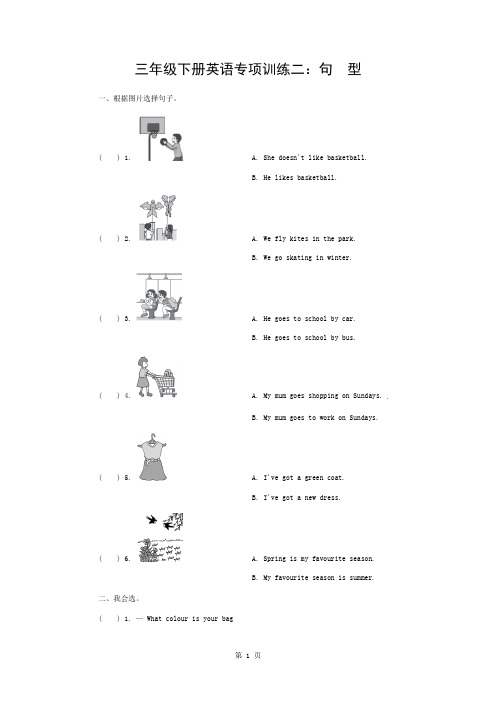
三年级下册英语专项训练二:句型一、根据图片选择句子。
( ) 1. A. She doesn't like basketball.B. He likes basketball.( ) 2. A. We fly kites in the park.B. We go skating in winter.( ) 3. A. He goes to school by car.B. He goes to school by bus.( ) 4. A. My mum goes shopping on Sundays.B. My mum goes to work on Sundays.( ) 5. A. I've got a green coat.B. I've got a new dress.( ) 6. A. Spring is my favourite season.B. My favourite season is summer.二、我会选。
( ) 1. — What colour is your bag—________A. It's black and red.B. It's my bag.C. It's nice. ( ) 2. —________—They are monkeys.A. What's thisB. What's thatC. What are they ( ) 3. I like ________.A. swimsB. swimingC. swimming ( ) 4. —Does Lingling like oranges?—________A. Yes, I do.B. No, she doesn't.C. Yes, he does. ( ) 5. —________—No, she isn't.A. Where is AmyB. Is Tom at homeC. Is Amy at home ( ) 6. —What do you ________ in the afternoon— I watch TV in the afternoon.A. doB. haveC. does( ) 7. —What ________ Mary have in the morning—She has Chinese and Maths.A. doB. doesC. doin g( ) 8. It's cool and ________ today.A. sunB. windC. sunny( ) 9. In autumn, he ________ under the tree.A. go swimmingB. goes fishingC. go fishing ( ) 10. —Has Sam got a new bike—________A. Yes, she does.B. No, he hasn't.C. Yes, he is.三、根据图示,选择正确的短语补全句子。
2021-2022学年高中英语译林版必修三习题:Unit 3单元质量检测三 Word版含答案
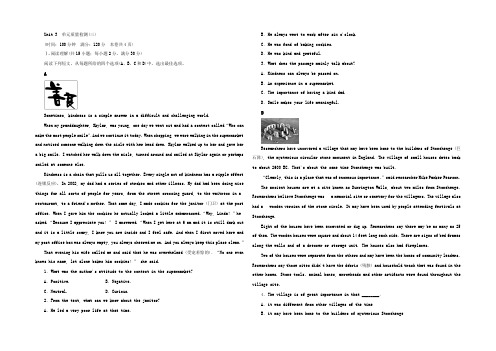
Unit 3 单元质量检测(三)(时间:100分钟满分:120分本卷共4页)Ⅰ.阅读理解(共15小题;每小题2分,满分30分)阅读下列短文,从每题所给的四个选项(A、B、C和D)中,选出最佳选项。
ASometimes, kindness is a simple answer in a difficult and challenging world.When my granddaughter, Skylar, was young, one day we went out and had a contest called“Who can make the most people smile”.And we continue it today. When shopping, we were walking in the supermarket and noticed someone walking down the aisle with her head down. Skylar walked up to her and gave her a big smile. I watched her walk down the aisle, turned around and smiled at Skylar again or perhaps smiled at someone else.Kindness is a chain that pulls us all together. Every single act of kindness has a ripple effect (连锁反应). In 2002, my dad had a series of strokes and other illness. My dad had been doing nice things for all sorts of people for years, from the street crossing guard, to the waitress in a restaurant, to a friend's mother. That same day, I made cookies for the janitor (门卫) at the post office. When I gave him the cookies he actually looked a little embarrassed.“Why, Linda?”he asked.“Because I appreciate you!” I answered.“When I get here at 6 am and it is still dark out and it is a little scary, I know you are inside and I feel safe. And when I first moved here and my post office box was always empty, you always cheered me on. And you always keep this place clean.”That evening his wife called me and said that he was overwhelmed (受宠若惊的).“No one even knows his name, let alone bakes him cookies!” she said.1.What was the author's attitude to the contest in the supermarket?A.Positive. B.Negative.C.Neutral. D.Curious.2.From the text, what can we know about the janitor?A.He led a very poor life at that time.B.He always went to work after six o'clock.C.He was fond of baking cookies.D.He was kind and grateful.3.What does the passage mainly talk about?A.Kindness can always be passed on.B.An experience in a supermarket.C.The importance of having a kind dad.D.Smile makes your life meaningful.BResearchers have uncovered a village that may have been home to the builders of Stonehenge (巨石阵), the mysterious circular stone monument in England. The village of small houses dates back to about 2600 BC. That's about the same time Stonehenge was built.“Clearly, this is a place that was of enormous importance,”said researcher Mike Parker Pearson.The ancient houses are at a site known as Durrington Walls, about two miles from Stonehenge. Researchers believe Stonehenge was a memorial site or cemetery for the villagers. The village also had a wooden version of the stone circle. It may have been used by people attending festivals at Stonehenge.Eight of the houses have been excavated or dug up. Researchers say there may be as many as 25 of them. The wooden houses were square and about 14 feet long each side. There are signs of bed frames along the walls and of a dresser or storage unit. The houses also had fireplaces.Two of the houses were separate from the others and may have been the homes of community leaders. Researchers say those sites didn't have the debris (残骸) and household trash that was found in the other homes. Stone tools,animal bones, arrowheads and other artifacts were found throughout the village site.4.The village is of great importance in that ________.A.it was different from other villages of the timeB.it may have been home to the builders of mysterious StonehengeC.it may become an attractive tourist siteD.it had 25 old houses newly excavated5.According to the text,what might NOT be found throughout the village?A.A stone tool.B.An animal bone.C.An arrowhead.D.An iron spade.6.Which of the following is NOT true of the village?A.There may be 25 of them already dug up.B.The houses of the village were wooden and square.C.There were signs of bed frames along the walls.D.There were fireplaces.7.The aim of this text would probably be ________.A.to encourage more people to love research workB.to advise people to protect ancient sitesC.to introduce a new discoveryD.to attract more visitors to comeCYou always have to understand what you are good at, and what you are not good at. Or if you are interested in something you always have to master it first.When I was ten, I came over to my cousin's house, and that was pain because he lived in New York and I lived in Miami. So I came over every summer break by myself, of course I had my parents' permission to go that far.One day, we decided to head to the forest. I was looking forward to this trip because I knew that my cousin was an expert on tree climbing while I was not. So, as we walked closer and closer to the forest, I became_jealous_because I did not possess the ability to climb trees. When he started climbing a tree I was upset but I joined him hoping not to break my neck. Last summer break he invited me to his house. I was afraid of climbing to the tree so I gave up. But this time I tried climbing the tree. While I was climbing I was so scared like I was about to die at any moment. But when I was about to climb on the other branch I lost my balance. Luckily I got hold on one of the bottom branches. My cousin suddenly started climbing down and tried to help me. After he put me on the ground, he ran to get some help. The pain was just killing me, I lost a lot of blood and I knew that I have to be awake to survive.Finally, my cousin brought the help. When I waked up I was happy that I did not die. It was pretty insane what happened to me.8.The text is mainly about________.A.my cousinB.how to learn to climb a treeC.an impressive experienceD.how to avoid being hurt when climbing9.Which of the following statements was NOT mentioned in the passage?A.The author's cousin was skillful at tree climbing.B.After falling off, the author lay on the ground.C.The author would see his cousin every summer vacation.D.It was the first time for the author to climb the tree.10.The underlined word“jealous”in paragraph 3 means “________”.A.嫉妒的B.可怕的C.感动的 D.紧急的11.We can learn from the passage that ________.A.The author would learn how to climb the tree after recoveringB.You can do anything well if you are interested in itC.You should know yourself well first and do what you canD.The author could go out without his parents' permissionDDo you know how to prepare for and survive a major earthquake? According to Department of Conservation scientists, it is important to have the right answer to that question.How to Be PreparedElectricity, water, gas (煤气) and telephones may not be working after an earthquake. The police and fire departments are likely to be tied up. You should be prepared to fend_for yourself for at least three days, preferably for a week. You'll need food, water and so on. It's also a good idea to decide ahead of time how and where your family will reunite if separated during a quake. You might choose an outofthearea friend or relative that family members can call to check on you.________If you're indoors, stay there. Get under a desk or table. The kitchen is a particularly dangerous spot. If you're in an office building, stay away from windows and outside walls and do not use the elevator. If you're outside, get into the open. Stay clear of buildings, power lines or anything else that could fall on you. If you're driving, move the car out of traffic and stop. Avoid parking under or on bridges or overpasses.After an EarthquakeCheck for fire. If you smell gas, shut off the main gas valve (阀). If there's sign of damage to electrical wiring, shut off the power at the control box. If the phone is working, only use it in case of emergency (紧急状况). Avoid driving if possible to keep the streets clear for emergency vehicles. Be careful that things may fall out of cupboards when the door is opened, and also that chimneys can be weakened and fall with just a touch. Listen to the radio for important information and instructions. Remember that aftershocks, sometimes large enough to cause damage in their own right, generally follow large quakes. If you leave home, leave a message telling your friends and family your location.12.The underlined phrase “fend for” in the second paragraph probably means “________”.A.look for B.take care ofC.be proud of D.think of13.Which of the following would be the best subtitle for the third paragraph?A.Before an EarthquakeB.After Making PreparationsC.While Staying at HomeD.During an Earthquake14.What should you do when an earthquake happens?A.You should stay away from the kitchen.B.You should drive on a bridge.C.You should turn off the power.D.You should listen to the radio frequently.15.According to the passage, why doesn't the author advise driving after an earthquake?A.Because it is dangerous to drive as there will be aftershocks.B.Because your car will be easily damaged in the streets full of blocks.C.Because you should make way for emergency vehicles.D.Because you can't find a place to park your car.Ⅱ.任务型阅读(共5小题;每小题2分,满分10分)依据短文内容,从短文后的选项中选出能填入空白处的最佳选项。
- 1、下载文档前请自行甄别文档内容的完整性,平台不提供额外的编辑、内容补充、找答案等附加服务。
- 2、"仅部分预览"的文档,不可在线预览部分如存在完整性等问题,可反馈申请退款(可完整预览的文档不适用该条件!)。
- 3、如文档侵犯您的权益,请联系客服反馈,我们会尽快为您处理(人工客服工作时间:9:00-18:30)。
译林三年级英语之阅读专项训练
class_______ name__________
阅读解题技巧
1.培养正确的阅读习惯:有许多孩子在长期的学习中往往形成了各种阅读习惯,如一个词一个词地读,且常伴有一些习惯动作:用手指、摆头等,这就是速读的障碍,并且可能影响到孩子一生的阅读。
有些不良的习惯会影响到他们正常的阅读,我们应注意纠正他们以下的不良方式:(1)用手指或笔指词阅读;(2)逐词阅读;(3)复读;(4)声读;(5)心译。
这些做法的结果往往是降低阅读速度,不利于把注意力集中在作者要表达的思想或传递的信息上。
应当指出,孩子在平常的阅读中都会出现个别的、有意识的复视或回视,但过分的回视则会影响阅读的速度乃至对文章有效的理解。
2.避免翻译:在开始的时候,逐句翻译成中文来心译理解是难以避免的一个现象。
但如果总要依赖翻译,养成习惯了,势必影响到阅读速度。
当然用英文直接思维,这不是一下子就可以完全做到的,但可以循序渐进,例如我们学了apple这个单词,我们在文章中见到它时,并不是按照英语——中文——实物去理解,而是可以直接由英语到实物。
针对性练习:Passage 1
Mr Brown lives in a nice house in a small town with his wife, Mrs Brown. From Monday(周一) to Friday(周五)he works in an office near his house. He is free on Saturdays and Sundays. He has a nice garden beside his house. He likes growing flowers and he often works in the garden on Saturdays and Sundays. The flowers are very beautiful and Mrs Brown likes them very much. She often helps Mr Brown.
( )1. Mr Brown lives in _________with his wife.
A. a city
B. a small town
C. a big town
( )2. He works_________ days(天)a week in his office.
A. four
B. five
C. six
( )3. He isn’t _________on Saturdays and Sundays.
A. free
B. busy
C. happy
( )4. He likes _________ on Saturdays and Sundays.
A. working in his garden
B. walking in his gardon
C. looking at his garden
( )5. Mrs Brown _________ the flowers.
A. likes
B. doesn’t like
C. often helps
注意:Mr,Miss与Mrs三者之间的区别。
Passage 2
Helen is a happy girl. She is ten years old. She is in Class Two, Grade(年级) Three. She is not tall or short. She has a round(圆的)face, two big eyes and a small mouth. And her hair is brown and long. She likes Chinese(汉语)very much. She wants to(想)go to China one day (有朝一日).
根据短文内容,选择合适的一项。
()1.Helen is a _________
A. happy girl
B. happy boy
C. baby
()2. Helen wants to go to _________ one day.
A. Chinese
B. China
C. England
()3. Helen is _________
A. not tall or short
B. tall and short
C. tall
()4.Helen has two _________ eyes.
A. small
B. big
C. long
()5. Helen has _________hair.
A. long brown
B. short brown
C. short black
技巧讲解:在阅读短文的时候,要注意题目的意思与短文的句子里面句子的关键词之间的对比。
Passage 3
David: Hello! My name’s David. What’s your name?
Joe: I am Joe.
David: Nice to meet you!
Joe: Nice to meet you, too! Where are you from?
David: I’m from America(美国). What about you?
Joe: I come from(来自)China. Can you speak Chinese?
David: I understand(懂)it a little, but I don’t speak it very well.
Joe: Oh, I understand English a little, but I don’t speak it very well.
David: Then(那么)let’s speak Chinglish(中式英文)!
Joe: Or Englese(英式英文)!
根据对话内容,判断句子正(T)误(F)。
()1.David and Joe are good friends.
()2. David comes from the USA.
()3. Joe can speak English very well.
()4. David doesn’t speak English well.
()5. Joe is from China.
注:come from=be(am, is are) from 来自(后接国家与地名)
Passage 4
Jack: These(这些) are black hens(). Those(那些) are white hens.
Kate: Black hens are cleverer (更聪明的) than(比) white hens, aren’t they?
Jack: How(如何) do you know?
Kate: Well, the black hens can lay(产蛋) white eggs, but the white hens cannot lay black eggs. 根据对话内容,判断句子正(T)误(F)。
()1. Those are some black hens.
()2. There aren’t any white hens.
()3. Black hens are cleverer than white hens.
()4. Black hens can lay white eggs.
()5. White hens can lay black eggs.
注:注意否定句的结构。
